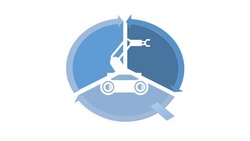Q-Rock
AI-based Qualification of Deliberative Behaviour for a Robotic Construction Kit

Robots learn their capabilities directly from their hardware and together with knowledge from humans, these become core elements for deliberative behavior. In Q-Rock a bidirectional mapping between hardware and behavior is established. With the help of Q-Rock, a user can specify a system by just specifying the intended behavior.
| Duration: | 01.08.2018 till 31.07.2021 |
| Donee: | German Research Center for Artificial Intelligence GmbH |
| Sponsor: | Federal Ministry of Education and Research |
| Grant number: | This research and development project is funded by the Federal Ministry of Education and Research (FKZ 01IW18003). |
| Application Field: |
Assistance- and Rehabilitation Systems
Agricultural Robotics Electric Mobility Logistics, Production and Consumer SAR- & Security Robotics Underwater Robotics Space Robotics |
| Related Projects: |
D-Rock
Models, methods and tools for the model based software development of robots
(06.2015-
05.2018)
|
| Related Robots: |
COMPI
Compliant Robot Arm
Mobipick
|
| Related Software: |
Phobos
An add-on for Blender allowing editing and exporting of robots for the MARS simulation
BOLeRo
Behavior Optimization and Learning for Robots
|
Project details
The Goal: Robots learn their capabilities directly from their hardware and together with knowledge from humans, these become core elements for deliberative behavior. In Q-Rock a bidirectional mapping between hardware and behavior is established. With the help of Q-Rock, a user can specify a system by just specifying the intended behavior.
The Approach: The project Q-Rock implements methods to allow the robot to explore its own capabilities based on the existing hardware configuration. The Q-Rock project is building upon the hardware database that was the result of the D-Rock project. The learned capabilities are then grouped using machine learning techniques and applying human knowledge about the behavior. Together with a semantic description, these blocks turn into cognitive cores, which are the building blocks for deliberative behavior. A learning framework will be conceptualized and implemented using evolutionary algorithms, deep learning and analytical approaches, so that the robot can explore the capabilities based on actuators and sensors. Finally, a bidirectional mapping between hardware and deliberative behavior will be created through a combination of dialogue based reasoning and structural reasoning approaches. With this loop closure between hardware and behavior, a user should be able to specify a system based on the intended behavior of the robot, without the necessity of being an expert on sensors, actuators or software.
The project is using a continuous integration approach to first define necessary interfaces and then set up the whole system with dummies where necessary. With the project making progress, these dummies will be filled with the frameworks and methods developed.
Videos
Intrinsic interactive reinforcement learning: Using error-related potentials

Thanks to human negative feedback, the robot learns from its own misconduct.
Q-ROCK: Digital Baukasten für neues Robotik-Design aus Anwenderperspektive


